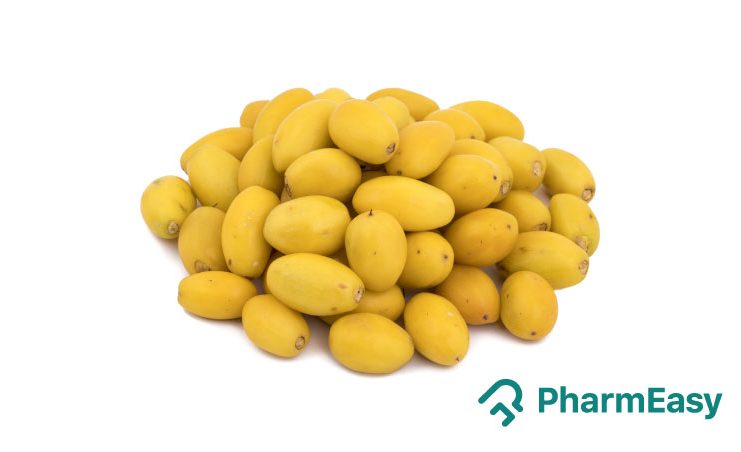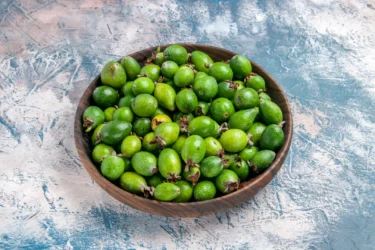Khirni Fruit: Uses, Benefits and Side Effects by Dr. Smita Barode
By Dr Smita Barode +2 more

Get,

to manage your symptom
Get your,


4 Cr+ families
benefitted

OTP sent to 9988776655



You’ve successfully subscribed to receive
doctor-approved tips on
Whatsapp

Get ready to feel your best.

Hi There,
Download the PharmEasy App now!!


Register to Avail the Offer
Send OTPBy continuing, you agree with our Privacy Policy and Terms and Conditions

Hi There,
Sign up on PharmEasy now!!
Trusted by 4 crore+ families

OTP sent to 9988776655



You have unlocked 25% off on medicines




Code: NU25
By Dr Smita Barode +2 more
Table of Contents
We all eat fruits, which are the primary source of protein, minerals and vitamins. Berries are some of the best fruits which we can eat daily. The Khiri fruit, which is ovoid, comes under berries and is the least used fruit. Popularly this Khirni fruit is called Rayan and the scientific name is Manilkara hexandra (Roxb) belongs to the family Sapotaceae. The Khirni fruit tree is naturally found in the tropical wilderness of India in the states of Maharashtra, Gujarat, Rajasthan, Bihar, Jharkhand, Madhya Pradesh andhra Pradesh and Orissa. Khirni fruits have economic importance and have been a significant source of livelihood for the Indian tribal population. Fresh Khirni fruit is sweet and acidic with one or more seeds. Khirni fruit in Hindi is called Khirani and in English is called Obtuse leaved mimusops1,2. This blog presents the Khirni fruit’s health benefits, nutritional value, potential uses and many more.

Khirni fruit nutritional facts may include the following:
| Nutrients | Value/100g |
| Protein | 0.48 % |
| Sugar | 17.80 % |
| Phosphorus | 17.00 mg |
| Calcium | 83mg |
| Iron | 0.92 mg |
| Vitamin C | 28.33 mg |
| Vitamin A | 675 IU |
Table 1: Nutritional value of Khirni fruit2.
Furthermore, other phytonutrients like flavonoids, catechin, phenolic compounds like quercetin, gallic acid, quercetin, kaempferol and vanillic acid, fatty acid esters like triterpene alcohols may be present in it1,3.
Did you know?
Khirni Rayan fruit may have the following properties:
Based on my observations, Khirni fruit is a rich source of vitamin C. Based on some studies, consumption of Khirni fruit might improve lung functions. This is because fresh fruits like Khirni, with high vitamin C content, can have positive effects on lung function5.
Dr. Siddharth Gupta, B.A.M.S, M.D (Ayu)
The potential Khirni fruit benefits are:

Khirni fruit is a significant source of proteins, carbohydrates, fats, sugar, calcium, iron, phosphorus and vitamins like vitamins A, B and C are also present. It may also have digestive and stomachic properties. Stomach discomforts such as dyspepsia, indigestion, burning sensations, bloating, gas and flatulence may affect day-to-day life. Regularly adding Khirni fruit to your diet may enhance digestion and help release flatulence (a burning sensation from the stomach). It may help clear out the colon and may reduce digestive distress1,3. However, more clinical studies are needed to establish the effects of Khirni fruit on digestive problems. If you experience persistent digestion problems, consult a specialist for proper treatment. Do not self-medicate.

Enteric disease or typhoid fever, is caused by certain multi-drug-resistant bacteria such as Salmonella typhi and Staphylococcus aureus. In lab studies, Mahida et al., 2007 found that Khirni fruit plant extract may have antibacterial activity against typhoid-causing bacteria3. These studies are conducted in laboratories therefore, more clinical proof is needed to support the antibacterial effect of Khirni fruit against typhoid. Take prescribed medicine to recover from such infections. Do not self-medicate.

Khirni Rayan fruit may have blood sugar-lowering properties. In animal studies, Nimbekar et al., 2013 found that the Khirni fruit extract may decrease blood glucose levels. In addition, it was found that Khirni fruit may significantly regulate blood sugar levels in type-2 diabetes. Therefore, this study3,4 may indicate that Khirni fruit may be employed in managing type-2 diabetes. More human research is needed to suggest the true scope of the Khirni fruit for diabetes. Diabetes is a serious health condition. It requires proper diagnosis and treatment. Do not self-medicate.

A literature study1,3,4 by Amandeep et al., 2021 suggests that Khirni fruit extract may have antibacterial activity and soothing skin effects (emollient). Skin infections such as facial acne and black spots may be caused due to certain bacteria (acne vulgaris). The paste prepared from unripe Khirni Rayan fruit pulp may apply to the affected areas. The regular application of Khirni fruit pulp may reduce skin inflammation. We need more research to develop Khirni fruit uses for skin infections. Suppose you have problems related to the skin; consult your doctor and do not self-medicate.

Khirni fruit and bark may contain a mixture of phytonutrients such as polysaccharides, saponins, sterols and tannins. These bioactive compounds may act as anti-inflammatory and analgesic activities. It might help purify the blood and its anti-inflammatory properties might help reduce swellings and redness during injuries3. However, this information is insufficient; therefore, more human interventions are needed to suggest the uses of Khirni fruit for swelling and inflammation. If you feel pain or swelling, take medical consultation and do not self-medicate.

Though studies show the potential uses of Khirni fruit in various conditions, these are insufficient and there is a necessity for further studies to develop the scope of the benefits of Khirni fruit on human health.
Khirni fruit is packed with many nutrients like vitamins and minerals like vitamin A, calcium, phosphorus, and iron. Consuming Khirni fruit might improve eye and bone health. It also might help with fever, jaundice and various gastric conditions6.
Dr. Rajeev Singh, BAMS
You may use Khirni fruit as follows:
You should consult a qualified doctor before having Khirni fruit in large quantities. They will guide you with its form and dosage per your health condition. Do not discontinue or replace an ongoing modern medical treatment with an ayurvedic/herbal preparation of Khirni fruit without consulting an ayurvedic physician.
No significant studies recorded the side effects of Khirni fruit in humans. However, Khirni fruit berries are astringent in taste as it contains a high amount of acid1. You must consult a doctor to get the proper treatment if you encounter any side effects after eating Khirni fruit.
Eating Khirni fruit in smaller quantities might be safe. However, eating in more significant amounts is not recommended. Follow the below precautions:
Less information is available regarding the interactions of Khirni fruit with other drugs. More human interventions are required to study herb-drug interactions. Therefore, avoid eating Khirni fruit with any medicine and if any complications arise, consult with doctors. Do not self-medicate.
Also Read: Raspberries: Uses, Benefits, Side Effects By Dr. Rajeev Singh
Khirni fruit berries are astringent. The berries are edible, sweet, milky and acidic2.
Other names of Khirni fruit are Rayan, Khirani and Obtuse leaved mimusops1.
The vitamins of Khirni fruit may include vitamin C and vitamin A2.
Khirni Rayan fruit may have blood sugar-lowering properties. In animal studies, the Khirni fruit extract may regulate blood sugar levels in type-2 diabetes4. More human research is needed to suggest the actual effects of Khirni fruit on diabetes. Do not self-medicate.
Khirni fruit berries may be eaten fresh as table fruit or converted into dehydrated fruit1.
Khirni fruit may have properties such as anti-ulcer, antioxidant, digestive, skin soothing, anti-inflammatory, diuretic, antipyretic, blood sugar-lowering, antimicrobial and analgesic1,4. If you have any above-mentioned issues consult your doctor and do not self-medicate.
Disclaimer: The information provided here is for educational/awareness purposes only and is not intended to be a substitute for medical treatment by a healthcare professional and should not be relied upon to diagnose or treat any medical condition. The reader should consult a registered medical practitioner to determine the appropriateness of the information and before consuming any medication. PharmEasy does not provide any guarantee or warranty (express or implied) regarding the accuracy, adequacy, completeness, legality, reliability or usefulness of the information; and disclaims any liability arising thereof.
Links and product recommendations in the information provided here are advertisements of third-party products available on the website. PharmEasy does not make any representation on the accuracy or suitability of such products/services. Advertisements do not influence the editorial decisions or content. The information in this blog is subject to change without notice. The authors and administrators reserve the right to modify, add, or remove content without notification. It is your responsibility to review this disclaimer regularly for any changes.
Comments

Leave your comment...
You may also like
Comments